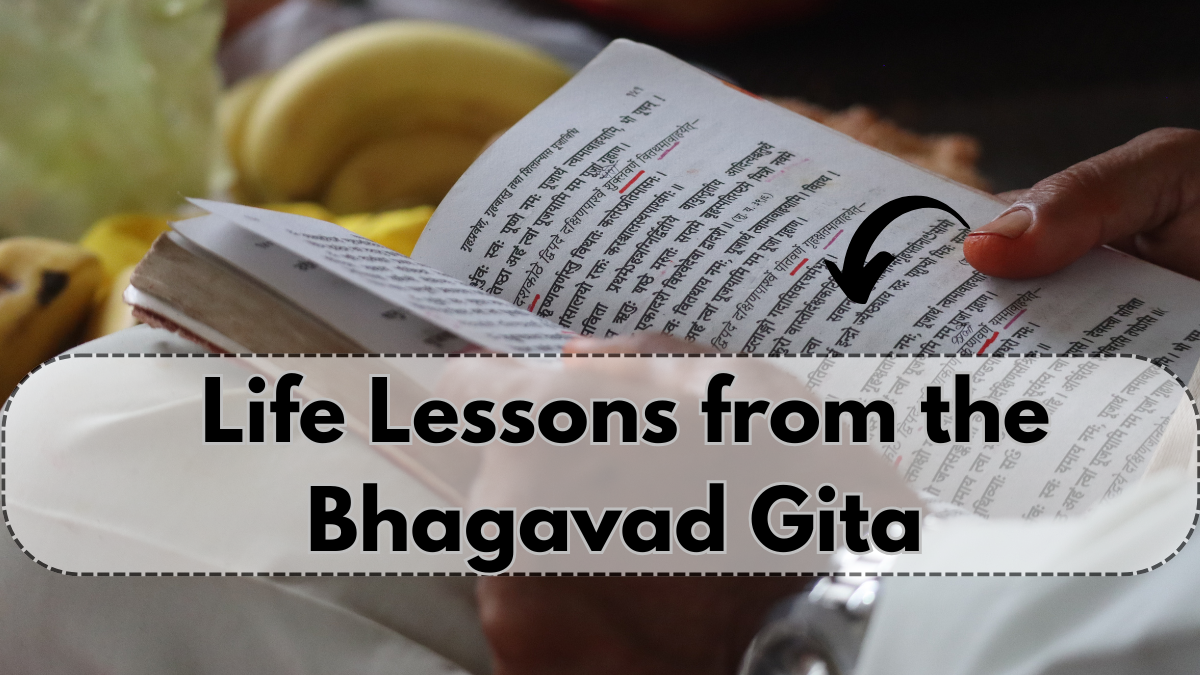The Bhagavad Gita is more than just an ancient Hindu scripture—it is a guidebook for life. Spoken by Lord Krishna to Arjuna on the battlefield of Kurukshetra, its teachings transcend religion and time. Whether we face confusion, stress, or moral dilemmas, the Gita teachings offer profound clarity. In today’s fast-paced world, these life principles help us align with our inner self and live more consciously.
Below are 10 powerful spiritual lessons from the Bhagavad Gita that remain deeply relevant in our modern lives.

1. Perform Your Duty Without Attachment to Results
This is perhaps the most famous teaching: “Do your duty, but don’t concern yourself with the outcome.” Known as karma yoga, this principle teaches us to focus on our actions with sincerity.
Life Application:
-
Concentrate on effort, not reward
-
Let go of anxiety over results
-
Build discipline and consistency
This central Gita teaching helps us stay grounded in our actions.
2. Balance Is the Key to Success
Lord Krishna emphasizes moderation in everything—sleep, food, work, and recreation. Excess in any area leads to imbalance and stress.
Practice of balance includes:
| Life Area | Suggested Practice |
|---|---|
| Sleep | 6–8 hours daily |
| Work | Focused and mindful hours |
| Food | Sattvic, nourishing diet |
Following this spiritual lesson improves both mental and physical health.
3. You Are Not the Body, But the Soul
The Bhagavad Gita teaches that our true identity is the atma or soul. Understanding this can reduce ego, fear, and emotional instability.
Key insight:
-
Life is eternal; the soul never dies
-
Situations are temporary
-
Death is only a transition
This idea fosters peace in the face of uncertainty and change.
4. Detachment Is Freedom
Karma yoga also involves detachment from materialism, relationships, and even personal expectations. It doesn’t mean abandoning responsibilities—it means performing them with calm awareness.
Spiritual practices for detachment:
-
Daily reflection or meditation
-
Accepting success and failure equally
-
Avoiding emotional over-dependence
The Gita teachings empower us to find inner stability amid outer chaos.
5. Be Steadfast in Your Dharma
Dharma means one’s rightful duty or path. According to the Bhagavad Gita, living according to your dharma leads to fulfillment, while abandoning it leads to confusion and regret.
How to align with dharma:
-
Understand your strengths
-
Choose the righteous path even when it’s tough
-
Do not imitate others’ roles
Living your dharma brings purpose and confidence.
6. Control the Mind Before It Controls You
The Gita teachings stress the importance of mastering the mind, which can be our best friend or worst enemy.
Helpful techniques:
-
Meditation and breathwork
-
Mindful thinking
-
Letting go of past regrets and future fears
Self-control is the gateway to wisdom, peace, and growth.
7. Seek Wisdom Over Worldly Pleasures
While worldly desires may seem fulfilling, they are temporary. The Bhagavad Gita urges us to seek lasting wisdom and self-realization.
Focus areas:
-
Reading scriptures
-
Practicing humility
-
Choosing inner joy over external validation
This spiritual lesson transforms how we view success and happiness.
8. Accept Change as a Law of Life
The Gita reminds us that nothing is permanent. Change is natural. Whether joy or sorrow, both will pass.
How to practice acceptance:
-
Avoid clinging to the past
-
Stay flexible in thinking
-
Embrace challenges as lessons
Acceptance brings mental freedom.
9. Surrender to a Higher Power
Surrendering to the divine doesn’t mean giving up—it means trusting a greater intelligence. This trust builds courage and clarity.
Spiritual actions include:
-
Daily prayer or chanting
-
Practicing gratitude
-
Aligning with karma yoga
The Bhagavad Gita emphasizes surrender as strength, not weakness.
10. Live with Compassion and Integrity
The final and most beautiful life lesson from the Bhagavad Gita is to live with kindness and righteousness.
Practices to live by:
-
Speak truthfully and gently
-
Help others without expecting returns
-
Follow ethical principles daily
Living with integrity makes life peaceful and fulfilling.
FAQs
What are some key Bhagavad Gita teachings?
Some key Gita teachings include karma yoga, detachment, mindfulness, dharma, and surrender to a higher power.
What is karma yoga according to the Gita?
Karma yoga means doing one’s duty without attachment to the outcome. It is about action with selflessness.
How does the Bhagavad Gita define dharma?
Dharma is defined as one’s righteous duty. Living by it leads to fulfillment and harmony.
Why is the Bhagavad Gita relevant in modern life?
Its spiritual lessons provide timeless wisdom on handling stress, confusion, and relationships in today’s world.
How can I apply the Gita’s teachings daily?
Start by practicing detachment, mindfulness, self-control, and integrity in your daily decisions and relationships.
Click here to know more.
